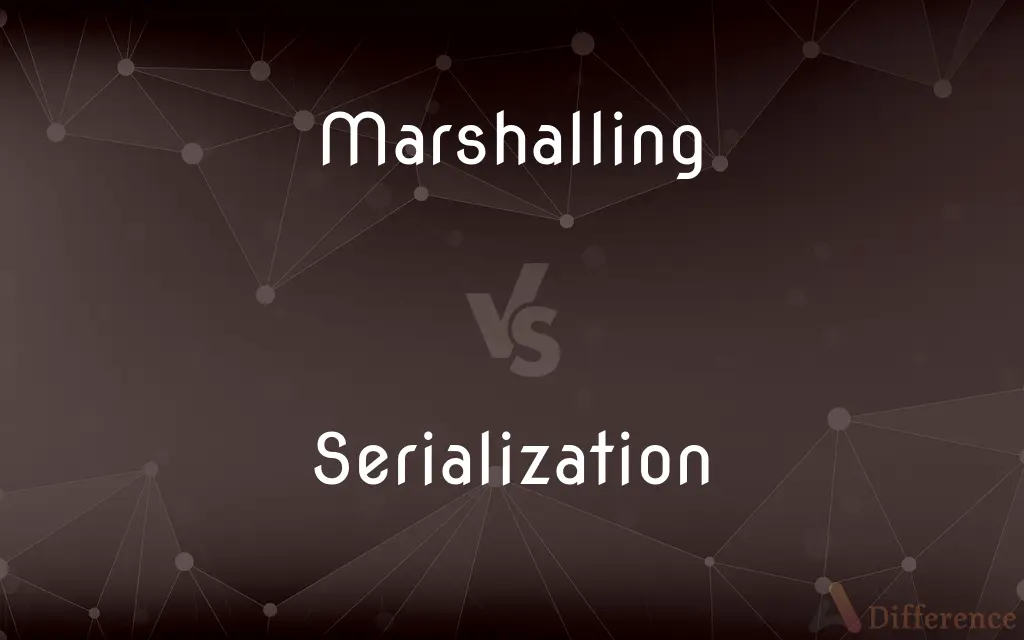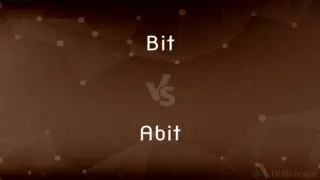Marshalling vs. Serialization — What's the Difference?
By Tayyaba Rehman & Urooj Arif — Updated on April 1, 2024
Marshalling is process of transforming memory objects into a format suitable for storage, focusing on object and interface references. Serialization converts data structures or object states into a format that can be stored and reconstructed later.

Difference Between Marshalling and Serialization
Table of Contents
ADVERTISEMENT
Key Differences
Marshalling is primarily used in remote procedure calls (RPCs), where it enables the communication between different programming environments by converting objects into a format that can be transmitted over a network. This process is crucial for distributed systems to ensure that object data and references are correctly interpreted on both the sender and receiver ends. On the other hand, serialization is a broader concept that involves converting an object's state into a byte stream for storage, transmission, or caching purposes. It serves as the foundation for a variety of applications, including deep copying, persisting objects to databases, and transferring data over networks.
While marshalling focuses on maintaining object references and interface details during the conversion process, ensuring that complex relationships between objects are preserved, serialization is more concerned with the data and state of objects. This distinction highlights marshalling's role in supporting the communication between different parts of a distributed system, whereas serialization is more about preserving the state of an object across different sessions or for communication between components that do not require awareness of the objects' interfaces or references.
Another key difference lies in the context of use. Marshalling is often associated with specific protocols and environments, such as those used in RPC frameworks like CORBA, .NET Remoting, or Java RMI, where the emphasis is on object and interface references to support method invocations across network boundaries. Serialization, however, is utilized across a wide range of programming languages and environments, including web development, application programming, and data storage, making it a more generic and versatile process.
The processes of unmarshalling and deserialization are the reverse of marshalling and serialization, respectively. Unmarshalling reconstructs the object from the marshalled data, re-establishing the object references and interfaces needed for remote communication. Conversely, deserialization reconstructs the object's state from the byte stream, without necessarily restoring complex object relationships or interface details, unless those aspects are part of the serialized data.
Furthermore, the choice between marshalling and serialization can be influenced by the specific requirements of the application or system in question. For example, when object interoperability and communication across different programming environments are necessary, marshalling is the preferred approach. In contrast, for general-purpose data persistence or communication where the focus is on the object's data rather than its interfaces, serialization is more applicable.
ADVERTISEMENT
Comparison Chart
Purpose
Converts objects for transmission in RPCs, focusing on object references and interfaces.
Converts objects to a byte stream for storage or transmission, focusing on object state.
Use Case
Distributed systems, method invocation across networks.
Data persistence, communication between components, deep copying.
Focus
Object references and interfaces.
Object data and state.
Context
Specific to protocols and environments like CORBA, .NET Remoting.
Generic, used across various programming languages and applications.
Reverse Process
Unmarshalling, which reconstructs objects with their references and interfaces.
Deserialization, which reconstructs the object's state from the byte stream.
Compare with Definitions
Marshalling
Process of converting objects for RPC communication.
Marshalling the object made it compatible for transmission over the network.
Serialization
Converts object state into a byte stream.
Serialization allowed the object's state to be saved to a file.
Marshalling
Focuses on maintaining object references.
Through marshalling, remote method calls preserved object interfaces.
Serialization
Enables object persistence and communication.
The app used serialization to store user data locally.
Marshalling
Used in distributed systems.
The distributed application relied on marshalling to communicate between its components.
Serialization
Independent of object references.
Serialization focused solely on the object's data, not its relationships.
Marshalling
Context-specific to protocols.
CORBA uses marshalling to ensure interoperability among distributed objects.
Serialization
Used across programming languages.
JSON serialization is popular for web applications.
Marshalling
Essential for method invocation across networks.
Marshalling enabled the invocation of methods on remote servers.
Serialization
Facilitates data transfer and storage.
Serialization made it easy to transmit data over the network and store it efficiently.
Marshalling
A military officer of the highest rank in some countries.
Serialization
In computing, serialization (US spelling) or serialisation (UK spelling) is the process of translating a data structure or object state into a format that can be stored (for example, in a file or memory data buffer) or transmitted (for example, over a computer network) and reconstructed later (possibly in a different computer environment). When the resulting series of bits is reread according to the serialization format, it can be used to create a semantically identical clone of the original object.
Marshalling
A field marshal.
Serialization
To write or publish in serial form.
Marshalling
An officer of the courts of the United States who performs various duties such as protecting judges, transporting prisoners, and apprehending fugitives.
Serialization
The process or action of converting something in a serial or into serial form.
Marshalling
A public official who performs various duties for the courts of a city, such as enforcing orders for money judgments or evictions.
Serialization
(computing) The process of serializing.
Marshalling
The head of a police or fire department in the United States.
Serialization
Publication in serial form
Marshalling
A person in charge of a parade or ceremony.
Marshalling
A high official in a royal court, especially one aiding the sovereign in military affairs.
Marshalling
To arrange or place (troops, for example) in line for a parade, maneuver, or review.
Marshalling
To arrange, place, or set in methodical order
Marshal facts in preparation for an exam.
Marshalling
To enlist and organize
Trying to marshal public support.
Marshalling
To guide ceremoniously; conduct or usher.
Marshalling
To take up positions in a military formation.
Marshalling
To take form or order
Facts marshaling as research progressed.
Marshalling
(British spelling) marshal
Marshalling
(software) The process of transforming the memory representation of an object to a data format suitable for storage or transmission, which is typically used when data must be moved between different parts of a computer program, or from one program to another.
Marshalling
(heraldry) The arrangement of an escutcheon to exhibit the alliances of the owner.
Marshalling
(rail) The sorting of rolling stock in a marshalling yard.
Common Curiosities
Is serialization only used for storing data?
No, serialization is also used for transmitting data across different components or systems, not just for storage.
Can marshalling be considered a form of serialization?
Yes, marshalling can be considered a specialized form of serialization, with additional emphasis on object references and interfaces for network communication.
Can all programming languages perform serialization?
Most modern programming languages support serialization, though the specific implementation and format can vary.
Why is marshalling important in distributed systems?
Marshalling ensures that objects and their interfaces can be accurately communicated and used across different parts of a distributed system, maintaining the integrity of method calls and data exchange.
What is the main difference between marshalling and serialization?
Marshalling is about transforming objects for network transmission with a focus on maintaining references and interfaces, whereas serialization is about converting object states into a byte stream for storage or transmission.
Are there security concerns with serialization?
Yes, serialization can introduce security vulnerabilities, such as exposing sensitive data or allowing arbitrary code execution, and should be handled with caution.
Can you serialize objects to formats other than byte streams?
Yes, objects can be serialized into various formats, including binary, XML, JSON, depending on the requirements and support of the programming environment.
Do marshalling and serialization affect performance?
Both processes can impact performance due to the overhead of converting objects to and from different formats, but they are essential for data persistence and communication in many applications.
How does unmarshalling differ from deserialization?
Unmarshalling reconstructs objects with their references and interfaces for RPCs, while deserialization restores the object's state without necessarily re-establishing complex relationships or interface details.
Is it possible to serialize or marshal every type of object?
Not all objects are easily serializable or marshallable, especially those with complex references or external resources, without additional effort to manage those aspects.
Share Your Discovery

Previous Comparison
Brimstone vs. Sulfur
Next Comparison
Bit vs. AbitAuthor Spotlight
Written by
Tayyaba RehmanTayyaba Rehman is a distinguished writer, currently serving as a primary contributor to askdifference.com. As a researcher in semantics and etymology, Tayyaba's passion for the complexity of languages and their distinctions has found a perfect home on the platform. Tayyaba delves into the intricacies of language, distinguishing between commonly confused words and phrases, thereby providing clarity for readers worldwide.
Co-written by
Urooj ArifUrooj is a skilled content writer at Ask Difference, known for her exceptional ability to simplify complex topics into engaging and informative content. With a passion for research and a flair for clear, concise writing, she consistently delivers articles that resonate with our diverse audience.















































